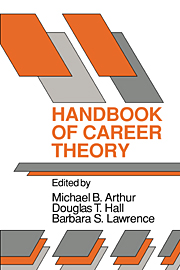Book contents
- Frontmatter
- Contents
- List of contributors
- Preface
- PART I CURRENT APPROACHES TO THE STUDY OF CAREERS
- Introduction to Part I
- 1 Generating new directions in career theory: the case for a transdisciplinary approach
- 2 Trait-factor theories: traditional cornerstone of career theory
- 3 Careers, identities, and institutions: the legacy of the Chicago School of Sociology
- 4 The utility of adult development theory in understanding career adjustment process
- 5 Developmental views of careers in organizations
- 6 Exploring women's development: implications for career theory, practice, and research
- 7 The influence of race on career dynamics: theory and research on minority career experiences
- 8 Asynchronism in dual-career and family linkages
- 9 Transitions, work histories, and careers
- 10 Career system profiles and strategic staffing
- PART II NEW IDEAS FOR THE STUDY OF CAREERS
- PART III FUTURE DIRECTIONS FOR THE DEVELOPMENT OF CAREER THEORY
- Name index
- Subject index
3 - Careers, identities, and institutions: the legacy of the Chicago School of Sociology
Published online by Cambridge University Press: 05 June 2012
- Frontmatter
- Contents
- List of contributors
- Preface
- PART I CURRENT APPROACHES TO THE STUDY OF CAREERS
- Introduction to Part I
- 1 Generating new directions in career theory: the case for a transdisciplinary approach
- 2 Trait-factor theories: traditional cornerstone of career theory
- 3 Careers, identities, and institutions: the legacy of the Chicago School of Sociology
- 4 The utility of adult development theory in understanding career adjustment process
- 5 Developmental views of careers in organizations
- 6 Exploring women's development: implications for career theory, practice, and research
- 7 The influence of race on career dynamics: theory and research on minority career experiences
- 8 Asynchronism in dual-career and family linkages
- 9 Transitions, work histories, and careers
- 10 Career system profiles and strategic staffing
- PART II NEW IDEAS FOR THE STUDY OF CAREERS
- PART III FUTURE DIRECTIONS FOR THE DEVELOPMENT OF CAREER THEORY
- Name index
- Subject index
Summary
A sociology which forgets its past may be committed to the continuous rediscovery of old ideas. When the provenance of thought is unknown, authorship can be claimed by those who lack any proper title to it. Old issues are proclaimed innovations, only to recede again into the limbo from which they were retrieved. The unstated component … is a fertile culture for the emergence of a cyclical pattern of recovery and loss.
Paul Rock, 1979Specialization rarely proceeds by simply redistributing tasks. Instead, most specialties evolve gradually by pruning back an initially broader set of interests. By sloughing off the fuzzier elements of earlier thought in favor of more developed concepts, nascent specialties ostensibly select more precise tools for roughing out a cumulative line of inquiry. In the process, however, fruitful but less articulate ideas may fall through the discipline's cracks. Consequently, when specialists stop to take stock of their progress, as is the partial function of a handbook such as this, they should not only seek to consolidate their hard-won treasures but also attempt to uncover long-neglected paths once blazed by their forebears. By so doing, specialists may reclaim realms of inquiry that might now be more profitably explored. Thus, it is with an eye to enriching career theory that this essay deals in what may seem the all-too-distant past.
My intent, however, is neither to write a history of career theory nor to lead modern scholars on a pilgrimage to their roots. Though such a trek might prove enlightening, it begs for a focus broader than my own.
- Type
- Chapter
- Information
- Handbook of Career Theory , pp. 41 - 65Publisher: Cambridge University PressPrint publication year: 1989
- 259
- Cited by

